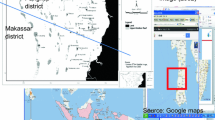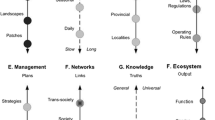Abstract
There are numerous frameworks for studying the governance of shared resources that have been discussed extensively in the literature. Although these frameworks have been applied to multiple case studies, these applications are often idiosyncratic, subject to the interpretation of the researcher, and raise concerns regarding the operational use of frameworks for case-study comparisons. As a result, insights from these studies have not lived up to the aspirations of the frameworks to generate generalizable knowledge. Here, based on several case studies and our experience using various frameworks for analyzing social-ecological systems, we undertake the task of providing a mechanism to systematically qualify interactions among ecological, social, institutional, and built infrastructure systems that impact the governance of shared resources. Specifically, we generate a series of archetypal social-ecological systems and extract from them a verb list to represent key interactions in the Robustness of Coupled Infrastructure Systems Framework. We then extend and refine the list based on three case studies of coastal social-ecological systems. We categorize these verbs and use them to demonstrate governance patterns across the case studies. We find that governance entities predominantly seek control over paths of change directed at lower governance levels rather than acting at their own level. Governance entities shed responsibility to lower governance levels without providing necessary resources. Finally, we find high potential for the cancelation of efforts due to lack of coordination among governance entities. The set of system archetypes and associated verb list is a first step in laying the foundation for a general typology of and a standardized protocol for representing the dynamics of CIS.




Similar content being viewed by others
Notes
There are several derivatives and extensions of the IAD and SES: Ghorbani et al. (2013) extend the IAD to the “Modeling Agent systems based on the Institutional Analysis” (MAIA) framework for agent-based simulation of SES. Hinkel et al. (2014) attempt to enhance the SES framework through formalization using very low-level language. The framework is well suited for formal analysis but difficult to operationalize for more empirical scholars. Schlüter et al. (2014) link variables with processes and processes to outcomes using tools from the scientific computing and modeling community to add the dynamics that the SES lacks. However, the utility of this approach is limited to scholars familiar with scientific computing language conventions. We consider these and other extensions as complementary to the Robustness Framework, but typically more specific to particular research communities.
This and more than 80 examples of example 2 archetypes collected by Ostrom and collaborators are cataloged in the Library on Governance in Social-Ecological systems (seslibrary.asu.edu). E.g., see https://seslibrary.asu.edu/node/569 for the forestry case just described.
References
Agrawal A (2002) Common resources and institutional sustainability. In: Ostrom E, Dietz T, Dolsak N, Stern P, Stonich S, Weber E (eds) The drama of the commons. National Academy Press, Washington, D.C, pp 41–85, DOI https://doi.org/10.17226/10287, (to appear in print)
Anderies JM (2015) Understanding the dynamics of sustainable social-ecological systems: human behavior, institutions, and regulatory feedback networks. Bull Math Biol 77 (2):259–280. https://doi.org/10.1007/s11538-014-0030-z
Anderies JM (2006) Robustness, institutions, and large-scale change in social-ecological systems: the Hohokam of the Phoenix Basin. J Institut Econ 2(2):133–155. https://doi.org/10.1017/S1744137406000312
Anderies JM, Janssen MA (2013) Robustness of social-ecological systems: implications for public policy. Policy Stud J 41(3):513–536. https://doi.org/10.1111/psj.12027
Anderies JM, Janssen MA, Ostrom E (2004) A framework to analyze the robustness of social-ecological systems from an institutional perspective. Ecol Soc 9(1):18
Anderies JM, Folke C, Walker B, Ostrom E (2013) Aligning key concepts for global change policy: robustness, resilience, and sustainability. Ecol Soc 18(2):8. https://doi.org/10.5751/ES-05178-180208
Anderies JM, Janssen MA, Schlager E (2016) Institutions and the performance of coupled infrastructure systems. Int J Commons 10(2):495 516. https://doi.org/10.18352/ijc.651
Araral E (2014) Ostrom, Hardin and the commons: a critical appreciation and a revisionist view. Environ Sci Polic 36:11–23. https://doi.org/10.1016/j.envsci.2013.07.011
Armitage D (2008) Governance and the commons in a multi-level world. Int J Commons 2(1):7–32. https://doi.org/10.18352/ijc.28
Balooni K, Ballabh V, Inoue M (2007) Declining instituted collective management practices and forest quality in the Central Himalayas. Econ Pol Wkly 42:1443–1452
Barreteau O, Giband D, Schoon M, Cerceau J, DeClerck F, Ghiotti S, James T, Masterson VA, Mathevet R, Rode S, Ricci F, Therville C (2016) Bringing together social-ecological system and territoire concepts to explore nature-society dynamics. Ecol Soc, 21(4). https://doi.org/10.5751/ES-08834-210442
Bastakoti RC, Shivakoti GP (2012) Rules and collective action: an institutional analysis of the performance of irrigation systems in Nepal. J Institut Econ 8(02):225–246. https://doi.org/10.1017/S1744137411000452
Cifdaloz O, Regmi A, Anderies JM, Rodriguez AA (2010) Robustness, vulnerability, and adaptive capacity in small-scale social-ecological systems: the Pumpa Irrigation System in Nepal. Ecol Soc 15(3):39. https://doi.org/10.5751/ES-03462-150339
Cox M, Arnold G, Tomás SV (2010) A review of design principles for community-based natural resource management. Ecol Soc 15(4):38. http://www.ecologyandsociety.org/vol15/iss4/art38/
Crawford E, Ostrom E (1995) A grammar of institutions. Am Polit Sci Rev 89(3):582–600. https://doi.org/10.2307/2082975
Daly HE (1973) Toward a steady-state economy. WH Freeman San Francisco. Isbn: 978-0716707936
Duit A, Galaz V, Eckerberg K, Ebbesson J (2010) Governance, complexity and resilience. https://doi.org/10.1016/j.gloenvcha.2010.04.006
Dyball R, Newell B (2014) Understanding human ecology: a systems approach to sustainability. Routledge. Isbn: 978-1-84971-382-5
Epstein G, Nenadovic M, Boustany A (2014a) Into the deep blue sea: commons theory and international governanc7e of atlantic bluefin tuna. Int J Commons 8:277–303. https://doi.org/10.18352/ijc.410
Epstein G, Pérez Ibarra I, Schoon M, Meek C (2014b) Governing the invisible commons: ozone regulation and the Montreal Protocol. Int J Commons 8:337–360. https://doi.org/10.18352/ijc.407
European Commission (2016) Integrated coastal management. http://ec.europa.eu/environment/iczm/index_en.htm
Ghorbani A, Bots P, Dignum V, Dijkema G (2013) Maia: a framework for developing agent-based social simulations. J Artif Societies Soc Simul 16(2):9. https://doi.org/10.18564/jasss.2166
Gibson CC, Andersson K, Ostrom E, Shivakumar S (2005) The Samaritan’s dilemma: the political economy of development aid. Oxford University Press, Oxford. Isbn: 9780199278855
Gordon H (1954) The economic theory of a common property resource: the fishery. J Polit Econ 62:124–142. https://doi.org/10.1086/257497
Guerbois C, Brady U, de Swardt AG, Fabricius C (2019) Nurturing ecosystem-based adaptations in south africas garden route: a common pool resource governance perspective. Reg Environ Change. https://doi.org/10.1007/s10113-019-01508-5
Gutiérrez NL, Hilborn R, Defeo O (2011) Leadership, social capital and incentives promote successful fisheries. Nature 470(7334):386. https://doi.org/10.1038/nature09689
Hinkel J, Bots P, Schlüter M (2014) Enhancing the Ostrom social-ecological system framework through formalization. Ecol Soc, 19(3). https://doi.org/10.5751/ES-06475-190351
Hooper DU, Adair EC, Cardinale BJ, Byrnes JE, Hungate BA, Matulich KL, Gonzalez A, Duffy JE, Gamfeldt L, O’Connor MI (2012) A global synthesis reveals biodiversity loss as a major driver of ecosystem change. Nature 486(7401):105. https://doi.org/10.1038/nature11118
INSEE (2014) Trente ans de démographie en languedoc-roussillon. https://www.insee.fr/fr/statistiques/1286007
Kiser LL, Ostrom E (1982) The three worlds of action: a metatheoretical synthesis of institutional approaches. In: Ostrom E (ed) Strategies of political inquiry. Sage, Beverly Hills, pp 179–222
Klinke A, Renn O (2012) Adaptive and integrative governance on risk and uncertainty. J Risk Res 15 (3):273–292. https://doi.org/10.1080/13669877.2011.636838
Long NE (1958) The local community as an ecology of games. Am J Sociol 64(3):251–261. https://doi.org/10.1086/222468
Lubell M (2013) Governing institutional complexity: the ecology of games framework. Polic Stud J 41 (3):537–559. https://doi.org/10.1111/psj.12028
Mazouni N, Loubersac L, Rey Valette H, Libourel T, Maurel P, Desconnets JC (2006) SYSCOLAG: a transdisciplinary and multi-stakeholder approach towards integrated coastal area management. an experiment in Languedoc-Roussillon (France). Vie et Milieu/Life & Environment 56(4):265–274
McKee R (2017) Homes evacuated as Cornwall hit by flash floods. http://www.theguardian.com/uk-news/2017/jul/18/homes-evacuated-as-cornwall-hit-by-flash-floods
Muneepeerakul R, Anderies JM (2018) Strategic behaviors and governance challenges in social-ecological systems. Earth’s Fut 5(8):865–876. https://doi.org/10.1002/2017EF000562
Nyoka N (2017) Series of evacuations as firefighters struggle to contain 26 Knysna fires. http://www.news24.com/SouthAfrica/News/series-of-evacuations-as-firefighters-struggle-to-contain-26-knysna-fires-20170607
Ostrom E (1990) Governing the commons: the evolution of institutions for collective action. Cambridge University Press. Isbh: 0521371015
Ostrom E (2005) Understanding institutional diversity. Princeton University Press, Princeton
Ostrom E (2007) A diagnostic approach for going beyond panaceas. Proc Nat Acad Sci 104(39):15181–15187. https://doi.org/10.1073/pnas.0702288104
Ostrom E (2009a) Design principles of robust property-rights institutions: what have we learned? In: Ingram GK, Hong YH (eds) Property rights and land policies. Isbn: 978-1-55844-188-0. Lincoln Institute of Land Policy, Cambridge
Ostrom E (2009b) A general framework for analyzing sustainability of social-ecological systems. Science 325 (5939):419–422. https://doi.org/10.1126/science.1172133
Ostrom E (2011) Background on the institutional analysis and development framework. Polic Stud J 39 (1):7–27. https://doi.org/10.1111/j.1541-0072.2010.00394.x
Ostrom E, Gardner R, Walker J (1994) Rules, games, and common-pool resources. University of Michigan Press, Ann Arbor
Poteete AR, Janssen MA, Ostrom E (2010) Working together: collective action, the commons, and multiple methods in practice. Princeton University Press
Rieucau J (2000) La grande-motte, ville permanente, ville saisonnière / la grande-motte, a town for all seasons and summertime resort. Annales De Gé,ographie 109(616):631–654. http://www.jstor.org/stable/23455825
Sabatier PA (1988) An advocacy coalition framework of policy change and the role of policy-oriented learning therein. Polic Sci 21(2-3):129–168. https://doi.org/10.1007/BF00136406
Savill R, Adams S (2009) Gale force winds and rain bring flooding to Cornwall. http://www.telegraph.co.uk/news/weather/6564354/Gale-force-winds-and-rain-bring-flooding-to-Cornwall.html
Schlüter M, Hinkel J, Bots P, Arlinghaus R (2014) Application of the SES framework for model-based analysis of the dynamics of social-ecological systems. Ecol Soc, 19(1). https://doi.org/10.5751/ES-05782-190136
Schumacher EF (1973) Small is beautiful: a study of economics as if people mattered. Blond & Briggs. Isbn: 978-0-06-091630-5
Therville C, Brady U, Barreteau O, Bousquet F, Mathevet R, Dhenain S, Grelot F, Brémond P (2018) Challenges for local adaptation when governance scales overlap. Evidence from Languedoc, France Regional Environmental Change. https://doi.org/10.1007/s10113-018-1427-2
Western Cape Government (2008) Eden district to be declared as a local disaster area. http://www.news24.com/SouthAfrica/News/series-of-evacuations-as-firefighters-struggle-to-contain-26-knysna-fires-20170607
Worm B, Barbier EB, Beaumont N, Duffy JE, Folke C, Halpern BS, Jackson JB, Lotze HK, Micheli F, Palumbi SR, Sala E, Selkoe KA, Stachowicz JJ, Watson R (2006) Impacts of biodiversity loss on ocean ecosystem services. Science 314(5800):787–790. https://doi.org/10.1126/science.1132294
Yu DJ, Qubbaj MR, Muneepeerakul R, Anderies JM, Aggarwal RM (2015) Effect of infrastructure design on commons dilemmas in social-ecological system dynamics. Proc Natl Acad Sci 112(43):13207–13212. https://doi.org/10.1073/pnas.1410688112
Funding
The authors gratefully acknowledge financial support for this work conducted during the MAGIC project (Multi-scale Adaptations to Global changes In Coastlines: ANR-13-JCLI-0005 and U.S. National Science Foundation ICER-1342933) under the Belmont Forum and G8 International Opportunities Fund (IOF).
Author information
Authors and Affiliations
Corresponding author
Ethics declarations
Conflict of interest
The authors declare that they have no conflict of interest.
Additional information
Publisher’s note
Springer Nature remains neutral with regard to jurisdictional claims in published maps and institutional affiliations.
Rights and permissions
About this article
Cite this article
Anderies, J.M., Barreteau, O. & Brady, U. Refining the Robustness of Social-Ecological Systems Framework for comparative analysis of coastal system adaptation to global change. Reg Environ Change 19, 1891–1908 (2019). https://doi.org/10.1007/s10113-019-01529-0
Received:
Accepted:
Published:
Issue Date:
DOI: https://doi.org/10.1007/s10113-019-01529-0




